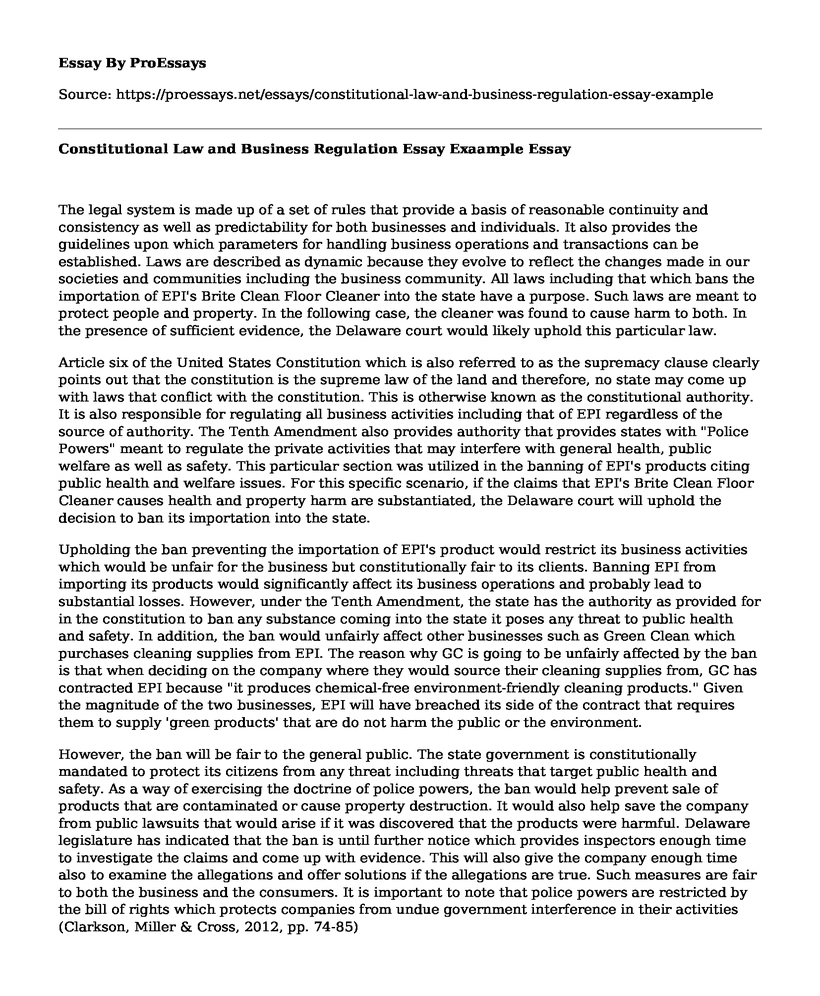The legal system is made up of a set of rules that provide a basis of reasonable continuity and consistency as well as predictability for both businesses and individuals. It also provides the guidelines upon which parameters for handling business operations and transactions can be established. Laws are described as dynamic because they evolve to reflect the changes made in our societies and communities including the business community. All laws including that which bans the importation of EPI's Brite Clean Floor Cleaner into the state have a purpose. Such laws are meant to protect people and property. In the following case, the cleaner was found to cause harm to both. In the presence of sufficient evidence, the Delaware court would likely uphold this particular law.
Article six of the United States Constitution which is also referred to as the supremacy clause clearly points out that the constitution is the supreme law of the land and therefore, no state may come up with laws that conflict with the constitution. This is otherwise known as the constitutional authority. It is also responsible for regulating all business activities including that of EPI regardless of the source of authority. The Tenth Amendment also provides authority that provides states with "Police Powers" meant to regulate the private activities that may interfere with general health, public welfare as well as safety. This particular section was utilized in the banning of EPI's products citing public health and welfare issues. For this specific scenario, if the claims that EPI's Brite Clean Floor Cleaner causes health and property harm are substantiated, the Delaware court will uphold the decision to ban its importation into the state.
Upholding the ban preventing the importation of EPI's product would restrict its business activities which would be unfair for the business but constitutionally fair to its clients. Banning EPI from importing its products would significantly affect its business operations and probably lead to substantial losses. However, under the Tenth Amendment, the state has the authority as provided for in the constitution to ban any substance coming into the state it poses any threat to public health and safety. In addition, the ban would unfairly affect other businesses such as Green Clean which purchases cleaning supplies from EPI. The reason why GC is going to be unfairly affected by the ban is that when deciding on the company where they would source their cleaning supplies from, GC has contracted EPI because "it produces chemical-free environment-friendly cleaning products." Given the magnitude of the two businesses, EPI will have breached its side of the contract that requires them to supply 'green products' that are do not harm the public or the environment.
However, the ban will be fair to the general public. The state government is constitutionally mandated to protect its citizens from any threat including threats that target public health and safety. As a way of exercising the doctrine of police powers, the ban would help prevent sale of products that are contaminated or cause property destruction. It would also help save the company from public lawsuits that would arise if it was discovered that the products were harmful. Delaware legislature has indicated that the ban is until further notice which provides inspectors enough time to investigate the claims and come up with evidence. This will also give the company enough time also to examine the allegations and offer solutions if the allegations are true. Such measures are fair to both the business and the consumers. It is important to note that police powers are restricted by the bill of rights which protects companies from undue government interference in their activities (Clarkson, Miller & Cross, 2012, pp. 74-85)
John and Jane are the founders of Sweet Bakers Company. This is a small business within the state that has been in the bakery industry for the last five years. It has managed to open its own stores within the state and gone an extra mile to secure a slot in some of the supermarkets, and other retail stores outside the state. However, in the last couple of months, there have been complains from the public that a specific brand of cookies is causing stomach pains in children. In the previous month, there have been more than five reported cases.
Conclusion
Because of such claims, the neighbouring state has enacted the police power under the Tenth Amendment in the United States Constitution banning the sale and importation of all brands from Sweet Bakers Company within the state until further notice. These regulations are meant to enforce order within the state territory for the betterment of general welfare and health of its citizens. In the last couple of months, the Sweet Bakers Company products have been under scrutiny by the state public health management with the aim of determining the extent of harm. The local government has also enforced its law by inspecting all local stores for any commodity from the Sweet Bakers Company. Unfortunately, company sales have significantly dropped which has largely inconvenienced the company.
References
Clarkson, K. W., Miller, R. L., & Cross, F. B. (2012). Business law: text and cases: legal, ethical, global, and corporate environment. Cengage Learning. pp. 74-85
Cite this page
Constitutional Law and Business Regulation Essay Exaample. (2022, Nov 20). Retrieved from https://proessays.net/essays/constitutional-law-and-business-regulation-essay-example
If you are the original author of this essay and no longer wish to have it published on the ProEssays website, please click below to request its removal:
- Essay Sample on Why Offenders Go Back to Prison
- Research Paper on the Effectiveness of Faith-Based Prison Programs on Recidivism Rates in the United States
- Essay Sample on Juvenile Justice: Processes, Screening, & Diversion
- Correctional Institutions: Challenges in Managing Staff Members - Essay Sample
- Exploring the Benefits of Studying Entrepreneurship: Who, What, and How - Essay Sample
- Ethics Education: Challenges of Being Honest in Business - Essay Sample
- Free Essay Sample on Same-Sex Marriage in the US







